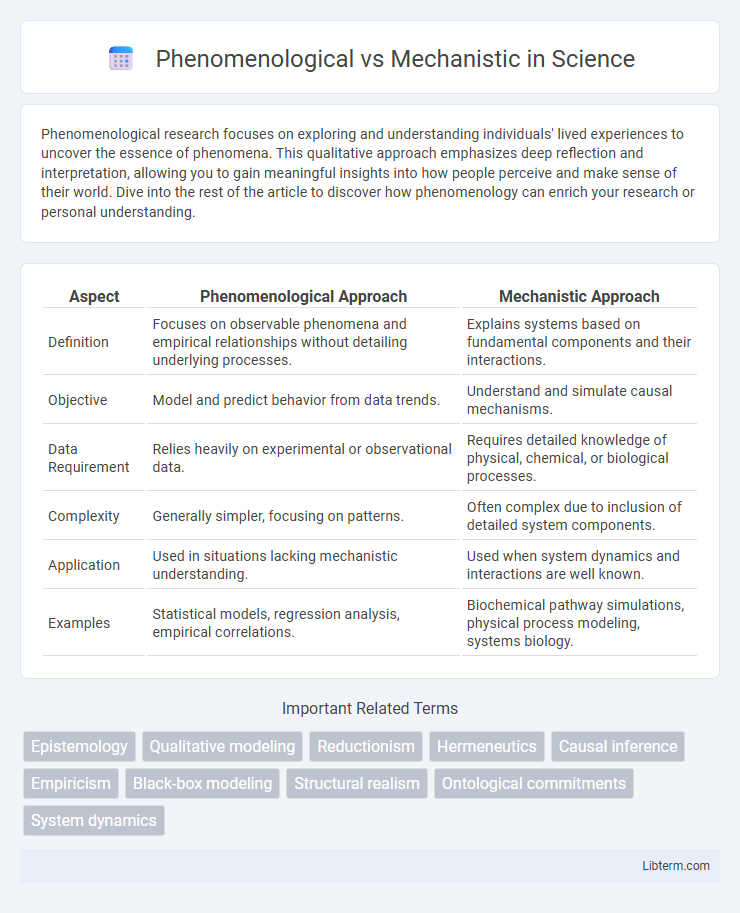Phenomenological research focuses on exploring and understanding individuals' lived experiences to uncover the essence of phenomena. This qualitative approach emphasizes deep reflection and interpretation, allowing you to gain meaningful insights into how people perceive and make sense of their world. Dive into the rest of the article to discover how phenomenology can enrich your research or personal understanding.
Table of Comparison
| Aspect | Phenomenological Approach | Mechanistic Approach |
|---|---|---|
| Definition | Focuses on observable phenomena and empirical relationships without detailing underlying processes. | Explains systems based on fundamental components and their interactions. |
| Objective | Model and predict behavior from data trends. | Understand and simulate causal mechanisms. |
| Data Requirement | Relies heavily on experimental or observational data. | Requires detailed knowledge of physical, chemical, or biological processes. |
| Complexity | Generally simpler, focusing on patterns. | Often complex due to inclusion of detailed system components. |
| Application | Used in situations lacking mechanistic understanding. | Used when system dynamics and interactions are well known. |
| Examples | Statistical models, regression analysis, empirical correlations. | Biochemical pathway simulations, physical process modeling, systems biology. |
Introduction to Phenomenological and Mechanistic Approaches
Phenomenological approaches emphasize understanding systems through observed behaviors and empirical relationships without detailing the underlying processes, making them ideal for complex or poorly understood phenomena. Mechanistic approaches focus on the detailed modeling of system components and their interactions based on fundamental principles, providing explanatory power and predictive accuracy when the system's internal workings are well known. Both methodologies offer complementary insights in scientific research, with phenomenological models prioritizing practical prediction and mechanistic models fostering deeper theoretical understanding.
Defining Phenomenological Models
Phenomenological models describe systems based on observed phenomena and empirical data without detailing the underlying mechanisms, capturing patterns and behaviors through direct measurements. These models prioritize reproducibility and accuracy in representing system responses across various conditions by fitting mathematical relationships to experimental results. Unlike mechanistic models that rely on theoretical structures and causal processes, phenomenological models serve practical applications where detailed knowledge of internal workings is unavailable or unnecessary.
Understanding Mechanistic Models
Mechanistic models provide detailed insights by representing the underlying processes and causal relationships within a system using mathematical equations and biological principles. These models enable precise predictions and hypothesis testing by capturing complex interactions at molecular, cellular, or systemic levels. Understanding mechanistic models is essential for advancing drug development, disease progression analysis, and personalized medicine through data-driven simulations.
Key Differences Between Phenomenological and Mechanistic Methods
Phenomenological methods focus on describing and analyzing observable behaviors or phenomena without delving into underlying causes, relying heavily on empirical data and qualitative insights. Mechanistic methods aim to understand and model the fundamental processes and causal mechanisms driving the system, often using mathematical or computational models to explain how components interact. The key difference lies in phenomenological approaches emphasizing descriptive accuracy and prediction, while mechanistic approaches prioritize explanatory power and understanding of underlying system dynamics.
Advantages of Phenomenological Approaches
Phenomenological approaches offer advantages in capturing complex, real-world phenomena without requiring detailed knowledge of underlying mechanisms, enabling flexible modeling based on empirical data. These methods excel in accommodating variability and uncertainty by focusing on observable inputs and outputs, which makes them highly practical for system identification and prediction in fields like engineering, biology, and social sciences. Their adaptability to sparse or noisy data situations enhances robustness and accelerates model development compared to mechanistic approaches demanding extensive parameterization.
Strengths of Mechanistic Approaches
Mechanistic approaches excel in providing detailed insights into causal relationships by breaking down complex systems into fundamental components and processes. This method enhances predictive accuracy and facilitates precise interventions in scientific and engineering fields. Emphasizing quantifiable data and reproducibility, mechanistic models enable systematic experimentation and validation, driving advancements in technology and applied research.
Limitations and Challenges in Each Approach
Phenomenological models face limitations in generalizability and predictive accuracy due to their reliance on empirical observations without fully understanding underlying mechanisms. Mechanistic models, while offering detailed insights into causality, often encounter challenges related to complexity, computational cost, and the need for extensive parameterization. Both approaches struggle with balancing model precision and applicability across diverse systems or conditions.
Use Cases: When to Use Phenomenological vs Mechanistic
Phenomenological models excel in fields like economics and social sciences where direct observation and empirical data drive predictions without requiring detailed understanding of underlying mechanisms. Mechanistic models are preferred in disciplines such as physics, chemistry, and biology when precise causal relationships and system dynamics need to be explicitly modeled for simulation or control. Use phenomenological approaches for rapid prototyping or when complexity makes mechanistic modeling impractical, while mechanistic methods are essential for high-fidelity analysis and engineering design requiring detailed system insights.
Integrating Both Approaches in Research and Practice
Integrating phenomenological and mechanistic approaches in research enhances understanding by combining subjective human experiences with objective biological processes. This hybrid methodology facilitates comprehensive models in psychology and medicine, improving diagnostic accuracy and personalized treatment strategies. Leveraging both perspectives fosters innovation and bridges gaps between qualitative insights and quantitative data.
Future Perspectives in Model Development
Future perspectives in model development emphasize integrating phenomenological approaches that capture complex system behaviors with mechanistic models grounded in fundamental physical laws. Advances in machine learning and hybrid modeling techniques enable enhanced predictive accuracy by combining data-driven insights with mechanistic understanding. This fusion fosters more robust, interpretable models applicable in fields such as materials science, climate prediction, and biomedical engineering.
Phenomenological Infographic

 libterm.com
libterm.com